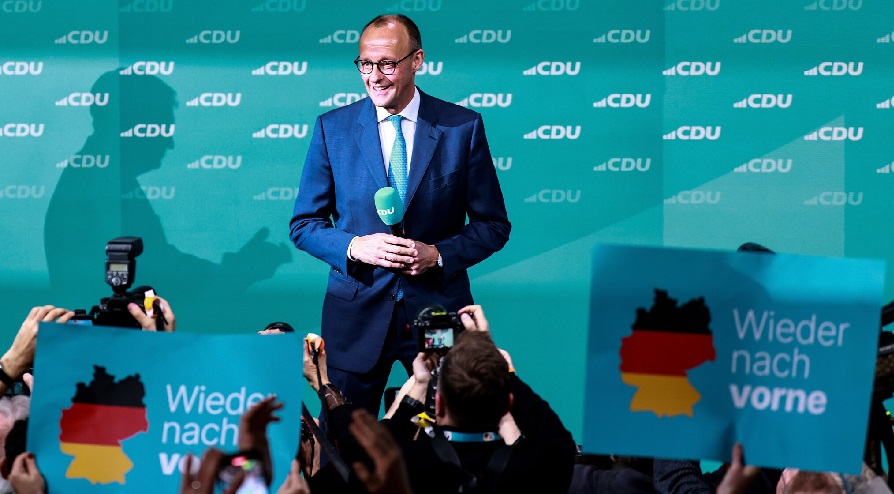The three main German car manufacturers closed the stock market with moderate gains in their stock prices, a day after the preliminary results of the general elections held on 23 February in Germany were announced.
Specifically, Mercedes-Benz closed on Monday with a 1.45% increase on the Frankfurt Stock Exchange, reaching 59.65 euros per share; so far in 2025, the group has risen by 10.87%.
Volkswagen Group, on the other hand, saw its stock price rise by 2.58%, reaching 101.45 euros per share, and so far this year, the German manufacturer has grown by 13.94%.
Finally, BMW Group saw a 0.97% increase in its stock price, with shares reaching 83.38 euros. In 2025, the Bavarian manufacturer has risen by 5.57%.
Germany’s Christian Democratic Union/Christian Social Union (CDU/CSU) won the legislative elections held last Sunday with 28.6% of the vote, according to preliminary results published by the German Electoral Commission after counting all the votes.
Specifically, the CDU, led by Friedrich Merz, secured 22.6%, while the Bavarian CSU gained 6%.
In second place is the Alternative for Germany (AfD) party, which received 20.8% of the votes, marking its best-ever result.
The provisional results of the 23 February general elections aligned with analysts’ expectations, as Merz and his CDU/CSU party secured around 28.5% of the votes, said MFS Investment Management’s fixed income research analyst, Annalisa Piazza.
Therefore, Merz is expected to be the next Chancellor of Germany, and negotiations to form a government will soon begin.
As Merz ruled out any possibility of forming an alliance with the far-right, it is most likely that a grand coalition with the SPD will be formed.
This comes amidst a backdrop of internal cyclical weakness (Germany has been the most lagging economy in the eurozone since 2019), with structural issues, deindustrialisation, transport, and digital transformation being some of the matters the new coalition government will have to address, alongside defence spending, explains the analyst.
There will also be discussions around changes to the debt brake rule, although any change would require a two-thirds majority.
Despite the still “conservative” approach to fiscal policy, Merz seems open to creating new European strategic “funds” to address current EU-level needs.
Read more: Countdown to the new German Government: What does the eMobility sector demand?
VOLKSWAGEN’S CRISIS, AN OUTSTANDING ISSUE
One of Germany’s critical industries, the automotive sector, was impacted over the past year by the country’s economic slowdown, in addition to low demand for electric vehicles in Europe and a decline in sales of German groups in China.
Specifically, Germany and Europe’s largest manufacturer, the Volkswagen Group, faced a crisis last year that nearly led to the closure of three of its plants in Germany and the dismissal of tens of thousands of employees.
In the end, the German union IG Metall reached an agreement with the carmaker’s management on the restructuring plan, which avoided plant closures and mass layoffs.
However, the company stated that it still plans to eliminate more than 35,000 jobs “in a socially responsible manner” by 2030 to regain its competitive edge.
THE THREAT OF TARIFFS ON GERMAN MANUFACTURERS
US President Donald Trump has threatened the European Union, and its two main trading partners – Mexico and Canada – with tariffs on vehicle imports.
This could affect German manufacturers that have plants south of the US border.
In particular, Volkswagen Group would be one of the most affected manufacturers if the 25% tariffs are implemented next year, according to credit rating agency Scope Ratings.
Volkswagen, BMW, and Mercedes-Benz have production plants in Mexico (Stellantis also manufactures in Canada) due to lower labour costs and proximity to the US market.
With 21% of its sales in the US market, Volkswagen’s exposure to this market is comparable to that of BMW and Mercedes.
However, Scope Ratings believes that Volkswagen – as a mass-market car manufacturer and truck supplier – is likely to be more affected by tariffs on Canada and Mexico and the potential increase in tariffs on European imports.
A significant portion of Volkswagen’s US sales comes from Mexico (for example, the VW Tiguan and International Truck brand), and its luxury brands such as Audi (excluding the premium Audi Q5 SUV and its sportier and plug-in hybrid versions produced in Mexico) and Porsche are particularly imported into the US market, which puts it at a disadvantage compared to BMW and Mercedes.
Top speakers participate in the “Storage, Renewable and Electric Vehicles Integration Forum”







